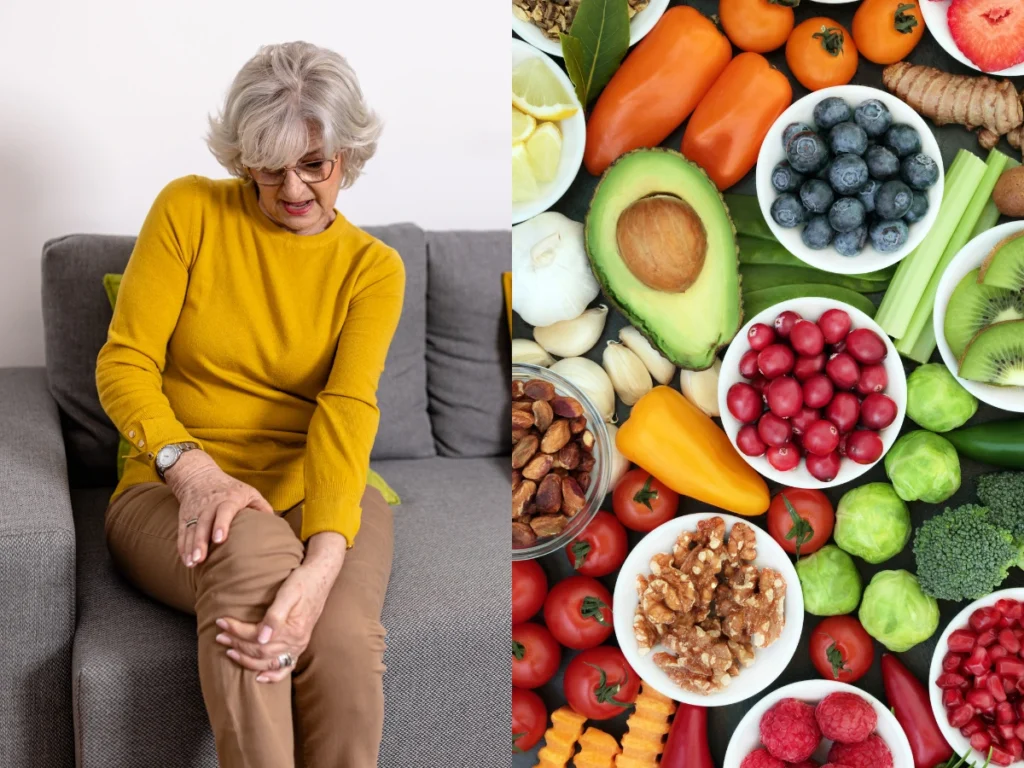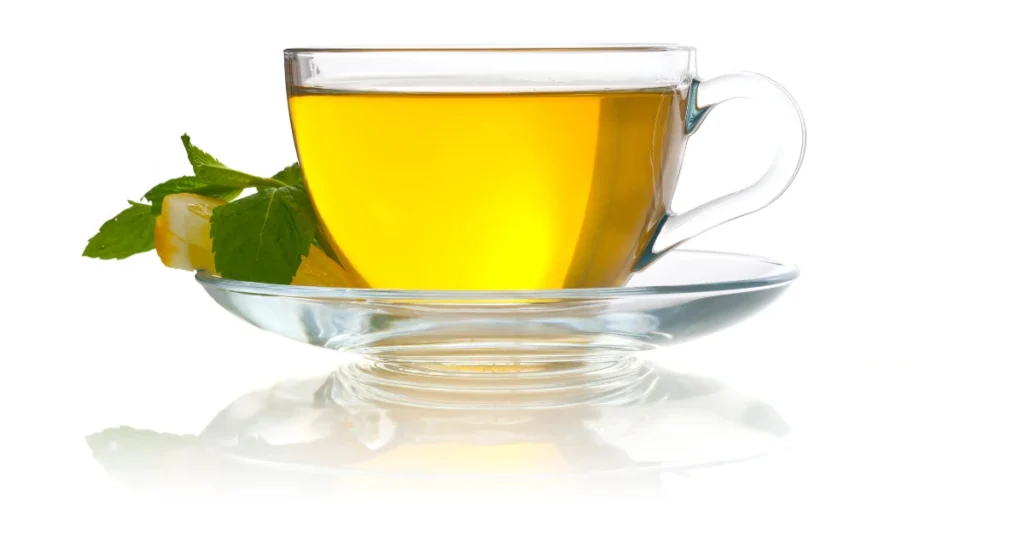
Chronic Inflammation Treatment: Eat the right food

By Aishakeel, 21 November 2023
Chronic inflammation treatment starts with what’s on your plate. Discover the power of eating right to tackle inflammation head-on. Uncover the secrets to a healthier, inflammation-fighting diet in this detailed article.
Is it possible to reduce inflammation by changing our diet? The answer is yes. Many scientific studies show that certain foods cause inflammation while others reduce inflammation. Some people have chronic inflammatory diseases like rheumatoid arthritis, ankylosing spondylitis, and ulcerative colitis and they report improvements in their symptoms when changing their eating habits.
Table of Contents
What Is Inflammation?
Inflammation is a word that’s thrown around a lot. It’s a medical term that refers to a normal reaction of the body to any threat, insult, trauma, attack, or infection. Your immune system reacts by sending white blood cells to combat the insult,
When tissue is damaged, immune cells release various chemical signals that trigger inflammation. It is a crucial part of the body’s defense mechanism as it helps to remove harmful substances, destroy pathogens, and initiate the healing process.
What Is Chronic Inflammation?
Chronic inflammation happens when that response lingers, leaving your body in a constant state of alert. Chronic inflammation is different and can be harmful.
However, in auto-immune diseases, chronic inflammation will not be normal. Auto-immune diseases occur when your immune system recognizes your cells as something that is threatening, and then, it will start attacking the normal cells. This is what happens in rheumatoid arthritis, psoriasis, ankylosing spondylitis, inflammatory bowel diseases, some types of thyroiditis, diabetes type 1, multiple sclerosis, and many other diseases.
We don’t know if fibromyalgia, a chronic pain condition is an auto-immune disease or not, but there are some recent indications that people with fibromyalgia have some chronic inflammation going on because there are some inflammatory markers that are higher in people with fibromyalgia.
Test For Chronic Inflammation
- Find your shin bone and locate the spot about three inches above your ankle.
- Press your thumb into the bone and push hard, holding it for 30 seconds
- Take your thumb off of your shin
Healthy people do not leave an impression but those with chronic inflammation have depression left over from their thumbprint.
Importance Of Healthy Food
Say you’re someone who eats a lot of processed and refined foods. These foods contain substances your body doesn’t know what to do with. Just as your immune system reacts to the poison from a bee sting, it also reacts to the substances from these foods. Over time this leads to a general state of inflammation in your whole body.
It’s a basic thing that when you don’t treat your body well, your immune system attacks, but it’s a silent war that takes place over time. You don’t feel the effects right away but day after day white blood cells release a host of chemicals that can damage all of the tissues in your body, like your heart, lungs, and kidneys. This increases your risk of having a heart attack, a stroke or even developing diabetes.
Now, if you are overweight pay attention to this. Fat tissue releases pro-inflammatory molecules, such as leptin and cytokines. So, even if you follow an anti-inflammatory diet, your levels of inflammation may not go down because your body is constantly releasing these pro-inflammatory substances from the excess fat that you are carrying around.
Before we continue, remember that this article is for educational purposes only. If you have a condition that needs medical advice, please talk to your doctor. If there is an emergency, go to the nearest emergency department.
What is an anti-inflammatory diet?
Now that we have explained what inflammation is, you can understand why an anti-inflammatory diet is so important.
It is not recommended to follow a radical diet for a few months and after that, you go back to your regular diet. This doesn’t work. The best approach is to incorporate healthy eating habits into your life for good.
If this diet is overwhelming for you, try changing one thing at a time. It is better to go slow and stick to it than to abandon it because you cannot persevere. Remember, you are what you eat.
So, what is an anti-inflammatory diet? Is it healthy? The answer is not surprising, as there is a lot of common sense in this diet.
If you eat unhealthy food your immune system is stuck in a never-ending war. Tissue damage will continue, so how can you calm down your immune system?
Well, the first step is to change what’s on your plate.
Avoid white bread, white flour, and gluten
Replace with gluten-free flour like:
- Almond flour
- Oat flour
- Brown rice flour
- Corn flour
- Tapioca
- Cassava flour.
Avoid white sugar, any kind of sugar, or artificial sweeteners
Replace with homemade sugar-free jams or just plain fruit that already contains sugars. It takes time to retrain your taste buds to sense natural sugars in fruits, vegetables, or milk. Once you train your taste buds without any added sugar or sweetener, you will be surprised how awful it tastes when you add anything to sweeten your drinks or food.
Fruits like blueberries, cherries, and pomegranates contain antioxidants. These are substances that reduce tissue damage they can do a lot to protect your internal organs.
Avoid soda, pops, and any kind of carbonated drinks
Replace with water, homemade tea, and freshly squeezed citrus fruits like oranges, lemons, and limes. Try berry smoothies like strawberry, blackberry, raspberry, or blueberry.
Avoid processed foods
Read these 5 ways to know if your food is processed.
Replace canned, frozen, and processed fruit and vegetables with fresh, raw vegetables and fruits.
Grapes contain anthocyanins which reduce inflammation. In addition, red grapes are also one of the best sources of Resveratrol, another antioxidant compound with many health benefits and studies show that Resveratrol can protect the heart against inflammation.
Replace processed meat by buying raw meat, poultry, or fish. If you cook yourself at home, then you will see that it is very different from boxed meat or fish.
Even the healthiest ingredients can be processed and then you lose all their benefits. For example, fish is very healthy, but if you buy a box where the fish has been prepared in a factory, fried in unhealthy oil, and has added preservatives to increase shelf life, then it is processed fish.
Fatty fish like salmon, sardines, herring, and mackerel are great sources of protein and the long-chain omega-3 fatty acids help reduce inflammation which can prevent metabolic syndrome, heart disease, diabetes, and kidney disease.

Our body metabolizes these fatty acids into compounds called resolvins and protectins which have anti-inflammatory effects. Studies have found that people consuming salmon or EPA and DHA supplements experienced reductions in the inflammatory marker or C-reactive protein.
Avoid unhealthy fats like trans fats or hydrogenated oils
Just read the labels and you will find these unhealthy fats in a lot of ingredients, including margarine, shortening, packaged meats, hot dogs, cookies, muffins, cupcakes, frozen pizza, microwave popcorn, and many more.
Replace with healthy fats, like extra virgin olive oil, and canola oil, and nuts like walnuts and almonds.
Extra virgin olive oil is one of the healthiest fats you can eat. It’s rich in monounsaturated fats and is a staple in the Mediterranean diet which provides numerous health benefits and can significantly decrease inflammatory markers. The effect of oleocanthal, an antioxidant found in olive oil, has been compared to anti-inflammatory drugs like ibuprofen. Remember that extra virgin olive oil has greater anti-inflammatory benefits than refined olive oils
Reduce red meat
There is no need to eliminate all red meat from your diet if you want to follow an anti-inflammatory diet because this can cause a vitamin B12 deficiency. But it is good to limit the amount of red meat to one or two meals per week.
Replace red meat with beans, lentils, chickpeas, and whole grains like kernels, quinoa, bulgur, brown rice, or oatmeal.
Also, eating cruciferous vegetables is associated with a decreased risk of heart disease and cancer this may be related to the anti-inflammatory effects of the antioxidants. So, vegetables like spinach, kale, broccoli, cauliflower, and brussels sprouts are highly recommended. Most of these vegetables are rich in sulforaphane, an antioxidant that decreases inflammation by reducing your levels of cytokines, and nuclear Factor Kappa B, which are molecules that drive inflammation in your body.
Read my post on Women’s Nutritional Requirements:A Comprehensive Guide for more details.
Limit the amount of alcohol
You don’t have to stop drinking alcohol completely, but it’s a good idea to limit it for a few reasons. This helps avoid getting too drunk, prevents alcohol use disorder, and helps with not gaining too much weight since alcohol has a lot of calories.
Replace sweetened cocktails, beer, and spirits with red wine. One glass of red wine a day is safe and it is rich in antioxidants.
Limit the amount of coffee
You don’t have to stop drinking coffee because it has benefits, but avoid having too much. Also, if you add too much cream, milk, sugar, or sweetener to your coffee, it might not be healthy for you.

Replace some coffee with green tea. Green tea contains antioxidants and many healthy compounds. Green tea such as matcha green tea is one of the healthiest beverages. Research has found that drinking green tea is associated with a reduced risk of heart disease, cancer, Alzheimer’s disease, obesity, and other conditions. Many of its benefits are due to its antioxidant and anti-inflammatory properties; especially a substance called Epigallocatechin-3-Gallate(EGCG) found in green tea which is a potent free radical scavenger and antioxidant. It inhibits inflammation by reducing pro-inflammatory cytokine production and damage to the fatty acids in our cells.
Avoid packaged snacks, especially when you are in a rush, hungry, and tired
You know when you get home, after a long day, when you want to grab a quick bite, sit and relax for a while. That is the dangerous hour. Have some containers with healthy snacks ready to grab. Keep an individual portion of nuts or fruits. Keep the leafy greens in your fridge, clean and ready to eat. Toss some olive oil and vinegar, and eat a big salad. Leafy greens like spinach, kale, and collards are excellent anti-inflammatory ingredients, you may use and abuse them. Toss them in smoothies, meat or bean dishes.
Turmeric
Turmeric is a spice with a warm earthy flavor, often used in curries and other Indian dishes. It has received a lot of attention because it contains curcumin, a powerful anti-inflammatory compound. Turmeric reduces inflammation related to arthritis, diabetes, and other diseases. It may be hard to get enough curcumin from turmeric alone to experience a noticeable effect, so taking supplements containing isolated curcumin may be much more effective.
Avocados
This nutrient-rich food contains potassium, magnesium, and fiber, and the rich, creamy texture of this fruit comes in part from its high concentration of anti-inflammatory monounsaturated fat. Additionally, avocados boast a significant content of the carotenoid lutein. Setting them apart from many other fruits, avocados serve as a valuable source of vitamin E, a micronutrient known for its anti-inflammatory properties.
Peppers
Bell peppers and chili peppers are filled with vitamin C and antioxidants that can help with inflammation. Bell peppers also have quercetin, an antioxidant that might lessen inflammation linked to ongoing health issues like diabetes. Chili peppers contain sinapic acid and ferulic acid, which can also reduce inflammation and help you age more healthily.
Dark chocolate
Dark chocolate has a lot of antioxidants that can lower inflammation and the chance of getting sick, and it can also help you age more healthily.

The flavanols in chocolate are the ones that make it good for reducing inflammation and keeping the cells in your arteries healthy. Choose dark chocolate containing at least 70% cocoa to promote anti-inflammatory benefits.
Mushrooms
You can eat different kinds of mushrooms like truffles, portobello, and shiitake. Mushrooms don’t have many calories, but they’re full of selenium, copper, and all B vitamins. They also have phenols and other things that stop inflammation. The lion’s mane mushroom might help lower inflammation linked to being overweight. It’s best to cook them lightly because cooking too much can make them lose their antioxidants.
Tomatoes
All types of tomatoes are really good for you. They have lots of vitamin C, potassium, and lycopene, which is an antioxidant that can reduce inflammation and lower the chance of getting some kinds of cancer. When you eat tomatoes with extra virgin olive oil, it helps your body soak up more of the lycopene because it’s a nutrient that works better when you eat it with a healthy fat.
Berries
Berries like strawberries, blueberries, raspberries, and blackberries are small fruits packed with fiber, vitamins, and minerals they contain antioxidants called anthocyanins.

These compounds have anti-inflammatory effects that may reduce your disease risk. A study found that adults with excess weight who ate strawberries had lower levels of specific inflammatory markers associated with heart disease than those who didn’t.
Conclusion
The anti-inflammatory diet is healthy. So, even people who do not have chronic inflammation or chronic pain may benefit from adopting this diet. To stick to this diet, try the PSCE approach:
PLAN
Plan your meals before you go to the grocery store, including the recipes and ingredients, and make a list of what you need to buy
SHOP
Only buy the ingredients on your list. Well, of course, if you see a similar ingredient that is on sale, or in season, and you can easily replace that in your meal plan, then go for it. But avoid the isles of processed foods, sweets, artificial drinks, and canned foods. Spend more time in the vegetables and fruit sections. Explore and be adventurous.
COOK
Try to cook all your meals at home. Limit the amount of take-outs and restaurants to very few special occasions, like birthdays and anniversaries. Invest in a nice pan set, maybe a slow cooker, a good blender, and measurement tools. If finding time to cook is a problem, then try to cook large batches for the whole week and freeze.
EAT Mindfully
Take your time to enjoy the meal, and eat mindfully observing the aroma, colors, texture, and taste. Eat slowly and if possible, make it an occasion to socialize with family, neighbor’s, or friends.
You don’t have to make a list of ingredients for the recipes that you make regularly. Only when you want to try a new recipe, bring the list of ingredients with you to the grocery shop.
Shop only once a week. Avoid going to the grocery store more often because you might end up buying some unhealthy stuff that you see and can’t resist.
Cook dinner every evening and you always eat the leftovers the next day at lunch. Cook a big batch and freeze in single portions for an emergency day when you are super busy or lazy. Also, prepare a healthy breakfast every morning. Eat dinner most days together as a family.
For most people, lunch is at work but make an effort to bring your healthy lunch box from home to warm up and eat there.
Remember WE ARE WHAT WE EAT!
Treat your body well every day so that your immune system can take care of simple things like a bee sting and recover from it.
Even low levels of inflammation on a chronic basis can lead to diseases, Do your best to keep inflammation at bay by choosing a wide variety of delicious antioxidant-rich foods eating foods, and avoiding processed foods. Choosing a variety of brightly colored fruits and vegetables can help provide more anti-inflammatory nutrients.
FAQs
Yes, scientific studies show that certain foods can cause or reduce inflammation, and individuals with chronic inflammatory diseases report improvements with dietary changes.
Inflammation is the body’s natural response to threats, injuries, or infections, involving immune cells releasing chemicals to combat harm and initiate healing.
Chronic inflammation occurs when the body remains in a constant state of alert, potentially leading to harm. In autoimmune diseases, the immune system attacks normal cells, aggravating conditions like rheumatoid arthritis and psoriasis.
A simple test involves pressing your thumb into the shin bone, and if a depression lingers, it may indicate chronic inflammation.
Processed and refined foods can trigger inflammation, leading to long-term health risks. Healthy eating helps calm the immune system and prevent tissue damage.
An anti-inflammatory diet focuses on incorporating long-term healthy eating habits, emphasizing whole foods and avoiding processed items to reduce inflammation.
Start by changing one dietary habit at a time to make the shift more manageable and sustainable, understanding that consistency is key.
Swap white bread and sugar for healthier alternatives, avoid processed foods, limit alcohol and coffee intake, and choose anti-inflammatory foods like fatty fish, berries, and leafy greens.
Yes, limiting alcohol is advised, but one glass of red wine a day can be safe and even beneficial due to its antioxidant content.
These foods contain compounds with powerful anti-inflammatory effects, helping reduce inflammation and promoting overall health.

Thank you for the auspicious writeup It in fact was a amusement account it Look advanced to far added agreeable from you However how can we communicate
Thank you so much for your appreciation. You can use the Contact Us information to communicate.